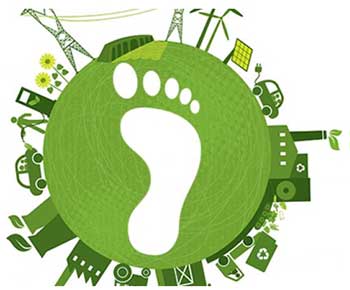Net Zero and India’s Objections
In News
The US President’s Special Envoy on Climate is at present on a three-day visit to India trying to renew a climate change partnership that was put on hold during the Donald Trump administration.
About
This visit is to exchange notes before the virtual Climate Leaders’ Summit that would be convened by US President Joe Biden on April 22-23 where India is also one of the invitees.
Net-zero, also named as carbon-neutrality, does not mean that a country would bring down its emissions to zero. Rather, net-zero is a condition in which a country’s emissions are recompensed by absorption and removal of greenhouse gases from the atmosphere.
Absorption of the emissions can be enhanced by making more carbon sinks such as forests, while removal of gases from the atmosphere needs advanced technologies such as carbon capture and storage.
Thus, it is even possible for a country to have negative emissions, if the absorption and removal surpass the actual emissions. Bhutan is the best example for this, which is often described as carbon-negative because it absorbs more than it emits.
A very active campaign has been going on, globally, for the last two years to sign on to a net-zero goal for 2050. It is being asserted that global carbon neutrality by 2050 is the only way to achieve the Paris Agreement target of maintaining the planet’s temperature from surging beyond 2°C compared to pre-industrial times.
The net zero is a long term goal evolved after decades of discussions. But the goal is lacking consensus at the global level.
Earlier, the discussions focused on emission-reduction targets, for 2050 or 2070, for developed countries, whose uncontrolled emissions over several decades are mainly blamed for global warming and consequent climate change. The net-zero formulation does not allot any emission reduction targets on any country.
In a manner, a country can become carbon-neutral at its present level of emissions, or even by increasing its emissions, if it is able to absorb or remove more. It’s a big relief for the developed countries because now the burden is shared by everyone, and does not fall only on them.
Objections raised by India
India is the only country that is denying this target because it is likely to be the most impacted by it. India’s position is unique. Over the next two to three decades, India’s emissions are expected to grow at the fastest pace in the world, as it is trying hard for higher growth to remove poverty. Any amount of afforestation or reforestation would not be able to compensate for the increased emissions and most of the carbon removal technologies available right now are either unreliable or very costly.
Most of the countries have submitted targets for the 2025 or 2030 period to achieve the Paris agreement goal. India is on its way to achieve three targets under Paris agreement and is emphasizing that other countries should also first of all fulfill the Paris Agreement promise and then move to net-zero target.
Several studies have shown that India is doing more on Climate than the US or other European countries.
India has pointed out that no major country achieved the emission-cut targets assigned to them under the Kyoto Protocol, the climate regime preceding the Paris Agreement. Some even walked out of the Kyoto Protocol, without any consequences. None of the countries has delivered on the promises they made for 2020. They also have very poor record on their commitment to donate money, and technology, to developing and poor countries to help them deal with the impacts of climate change.
India is not sure that it will be able to achieve carbon neutrality by 2050 and so is reluctant to make such promise in advance.







